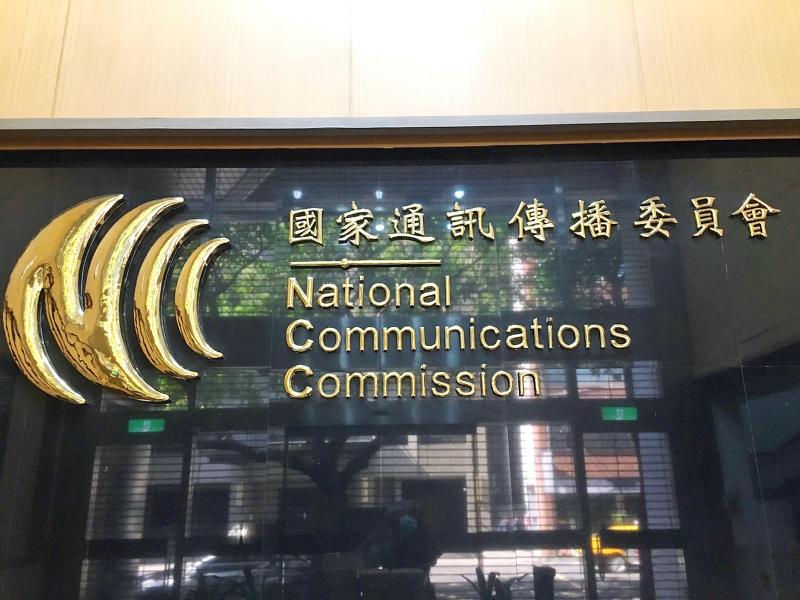The National Communications Commission (NCC) is to begin accepting applications in June from telecoms planning to offer low-Earth orbit satellite services.
The commission reached the decision after approving draft rules governing the appropriation and assignment of radio frequency bands for satellite communications in its weekly meeting on Wednesday.
The rules are to be open for public scrutiny for 60 days, NCC Vice Chairman and spokesman Wong Po-tsung (翁柏宗) said, adding that the commission would host information sessions next month or in May to gather opinions before announcing the finalized rules.

Photo: Yang Mien-chieh, Taipei Times
Industry observers attributed the commission’s accelerated timeline to complete the regulatory framework for low-Earth orbit satellite services to the activity of people caught up in the Russian invasion of Ukraine.
Ukrainians have been able to upload videos and photographs of war zones to the Internet through satellites provided by Starlink, a unit of Elon Musk’s SpaceX Corp.
Satellite communications can be backup channels for public telecommunications networks, and reinforce links at sea, as well as on outlying islands and in mountainous areas, the commission said, adding that the technology would greatly lower the costs of universal telecommunications services.
The Executive Yuan has released four additional frequency bands for use by geostationary and non-geostationary satellite communications service providers: 10.7 to 12.7 gigahertz (GHz), 13.75 to 14.5GHz, 17.7 to 20.2GHz and 27.5 to 30 GHz.
The 27.9 to 29.5GHz band is used by Chunghwa Telecom, Far EasTone Telecommunications, Asia Pacific Telecom and Taiwan Mobile for 5G.
Satellite service operators that plan to acquire bandwidth must reach agreements with the telecoms to avoid interference between the two systems, the commission said.
To be eligible, applicants must be telecoms registered in Taiwan and managed by Taiwanese, the commission said.
Direct shareholding by foreigners must not exceed 49 percent, while indirect shareholding by foreigners is limited to 60 percent, it said.
Operators can only launch services after their networks pass NCC scrutiny, it said.
Foreign operators can form partnerships with Taiwanese telecoms to file applications, it said.
Three overseas low-Earth orbit satellite operators were reported to have inquired about regulations in Taiwan: SpaceX, One Web and Telesat.

Taiwanese can file complaints with the Tourism Administration to report travel agencies if their activities caused termination of a person’s citizenship, Mainland Affairs Council Minister Chiu Chui-cheng (邱垂正) said yesterday, after a podcaster highlighted a case in which a person’s citizenship was canceled for receiving a single-use Chinese passport to enter Russia. The council is aware of incidents in which people who signed up through Chinese travel agencies for tours of Russia were told they could obtain Russian visas and fast-track border clearance, Chiu told reporters on the sidelines of an event in Taipei. However, the travel agencies actually applied

Japanese footwear brand Onitsuka Tiger today issued a public apology and said it has suspended an employee amid allegations that the staff member discriminated against a Vietnamese customer at its Taipei 101 store. Posting on the social media platform Threads yesterday, a user said that an employee at the store said that “those shoes are very expensive” when her friend, who is a migrant worker from Vietnam, asked for assistance. The employee then ignored her until she asked again, to which she replied: "We don't have a size 37." The post had amassed nearly 26,000 likes and 916 comments as of this

New measures aimed at making Taiwan more attractive to foreign professionals came into effect this month, the National Development Council said yesterday. Among the changes, international students at Taiwanese universities would be able to work in Taiwan without a work permit in the two years after they graduate, explainer materials provided by the council said. In addition, foreign nationals who graduated from one of the world’s top 200 universities within the past five years can also apply for a two-year open work permit. Previously, those graduates would have needed to apply for a work permit using point-based criteria or have a Taiwanese company

The Shilin District Prosecutors’ Office yesterday indicted two Taiwanese and issued a wanted notice for Pete Liu (劉作虎), founder of Shenzhen-based smartphone manufacturer OnePlus Technology Co (萬普拉斯科技), for allegedly contravening the Act Governing Relations Between the People of the Taiwan Area and the Mainland Area (臺灣地區與大陸地區人民關係條例) by poaching 70 engineers in Taiwan. Liu allegedly traveled to Taiwan at the end of 2014 and met with a Taiwanese man surnamed Lin (林) to discuss establishing a mobile software research and development (R&D) team in Taiwan, prosecutors said. Without approval from the government, Lin, following Liu’s instructions, recruited more than 70 software